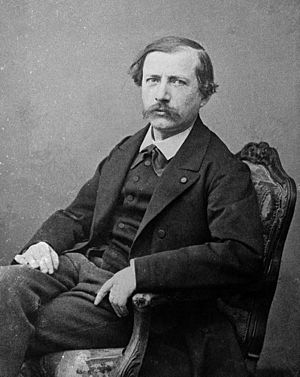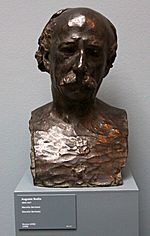Marcellin Berthelot facts for kids
Quick facts for kids
Marcellin Berthelot
FRS FRSE
|
|
|---|---|
 |
|
| Born |
Pierre Eugène Marcellin Berthelot
25 October 1827 |
| Died | 18 March 1907 (aged 79) Paris, French Republic
|
| Known for | Thomsen–Berthelot principle Berthelot's reagent Principle of maximum work |
| Spouse(s) | Sophie Berthelot |
| Children |
|
| Awards |
|
| Scientific career | |
| Fields | Chemistry (thermochemistry) |
| Influences | Antoine Jérôme Balard |
Pierre Eugène Marcellin Berthelot FRS FRSE (French: [bɛʁtəlo]; 25 October 1827 – 18 March 1907) was a French chemist and Republican politician noted for the Thomsen–Berthelot principle of thermochemistry. He synthesized many organic compounds from inorganic substances, providing a large amount of counter-evidence to the theory of Jöns Jakob Berzelius that organic compounds required organisms in their synthesis. Berthelot was convinced that chemical synthesis would revolutionize the food industry by the year 2000, and that synthesized foods would replace farms and pastures. "Why not", he asked, "if it proved cheaper and better to make the same materials than to grow them?"
He was considered "one of the most famous chemists in the world." Upon being appointed to the post of Minister of Foreign Affairs for the French government in 1895, he was considered "the most eminent living chemist" in France. In 1901, he was elected as one of the "Forty Immortals" of the Académie française. He gave all his discoveries not only to the French government but to humanity.
Contents
Personal life
Berthelot was born in Rue du Mouton, Paris, France, on 25 October 1827, the son of a doctor. He decided with his friend, the great historian Ernest Renan, not to attend a grande école where the vast majority of intellectuals were being educated. After doing well at school in history and philosophy, he became a scientist.
He was an atheist but was very influenced by his wife, who was a Calvinist (his wife came from Louis Breguet's family).
Discoveries
The fundamental conception that underlay all Berthelot's chemical work was that all chemical phenomena depend on the action of physical forces which can be determined and measured. When he began his active career it was generally believed that, although some instances of the synthetic production of organic substances had been observed, on the whole organic chemistry remained an analytical science and could not become a constructive one, because the formation of the substances with which it deals required the intervention of vital activity in some shape. He engaged in a long argument with Louis Pasteur on the subject of vitalism, in which Pasteur took the vitalist position on the basis of his work on alcoholic fermentation.
To this attitude he offered uncompromising opposition, and by the synthetic production of numerous hydrocarbons, natural fats, sugars and other bodies he proved that organic compounds can be formed by ordinary methods of chemical manipulation and obey the same principles as inorganic substances, thus exhibiting the "creative character in virtue of which chemistry actually realizes the abstract conceptions of its theories and classifications—a prerogative so far possessed neither by the natural nor by the historical sciences."
Recognition
In 1863 he became a member of the Académie Nationale de Médecine; he was also awarded the Grand Cross of the Legion of Honour. He was elected a Foreign Honorary Member of the American Academy of Arts and Sciences in 1880. In 1881 he became a foreign member of the Royal Netherlands Academy of Arts and Sciences.
Avenue Berthelot in Lyon was named after him on 25 March 1907.
Family
Berthelot died suddenly on 18 March 1907, immediately after the death of his wife Sophie Niaudet (1837–1907), in Paris. His professorship was filled by Emil Jungfleisch.
He was buried with his wife in the Panthéon. He had six children: Marcel André (1862–1939), Marie-Hélène (1863–1895), Camille (1864–1928), Daniel (1865–1927), Philippe (1866–1934), and René (1872–1960).
In art
Auguste Rodin created a bust of Berthelot.
See also
 In Spanish: Marcellin Berthelot para niños
In Spanish: Marcellin Berthelot para niños
- Abiogenic petroleum origin
- Berthelot's reagent


